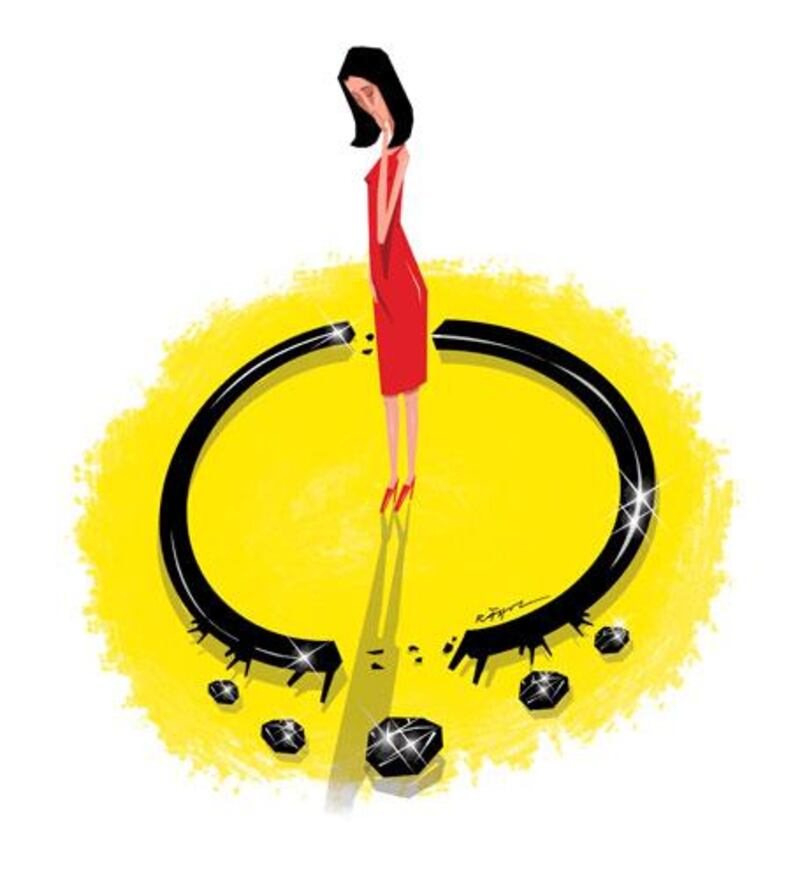When Randa Khalisi married, she received two rings from her husband. The wedding band, which she designed herself, was a round-cut diamond surrounded by three square stones, all set in white gold. Mohammed, her husband, sketched out a design for the engagement ring - five diamonds in a straight line, with the larger centre stone rising above the others. These rings, appraised at Dh52,000, were slipped on her finger on January 27, 2008, when the couple tied the knot. She never thought about keeping receipts and diamond certificates for her rings. And one year later, this misstep would cost her Dh24,000, after she filed for a divorce.
Ms Khalisi, 26, a graphic designer from Canada, met her future husband, a Saudi national, in July 2004. They were both attending university in Vancouver at the time. Ms Khalisi was working in a video rental store for the summer, and her ex-husband was a regular customer. And the rest is history. After two years of courtship they were engaged, and they moved to Saudi Arabia after the wedding to start a new life. But the marriage soon soured, and she left Saudi Arabia in March 2009 to join her parents, who were working in the UAE. She was eager for a fresh start - and that included selling the rings.
"But it's not like buying and selling gold," Ms Khalisi says. "Selling diamonds is much harder. Gold can be weighed and you'll generally get the same price anywhere. For my rings, I was initially offered anywhere from Dh3,000 to Dh40,000." The problem, she says, is that she didn't have any documents or certificates verifying the value and authenticity of the stones. Whenever you purchase diamonds, experts say you should always ask for a certificate describing the cut, measurement, colour, clarity and carat size of each diamond. The paperwork should be dated and authorised by a recognised laboratory, such as the Gemological Institute of America or the European Gemological Laboratory.
So without the documentation, getting serious offers for Ms Khalisi's rings proved to be a long and arduous process. She started with the malls in Abu Dhabi, going from store to store and showing the rings to countless clerks. The best offer came from Damas, a popular jewellery retailer; they agreed to give her Dh40,000 for both pieces - but for store credit only. While Ms Khalisi considered the offer, she decided to take her business elsewhere.
She wanted cash, and she soon discovered that most mainstream establishments in the malls were interested in exchanges only. Her next stop was the Madinat Zayed Gold Souk in Abu Dhabi, which she found to be a much better place to bargain. "At the souk you can go door to door," she says. "It's a lot more convenient, and you're bound to eventually find someone who is interested and won't rip you off."
But the negotiations didn't begin well. The first merchant she visited offered her just Dh3,000 for the engagement ring, and Dh2,000 for the wedding band - a whopping Dh47,000 less than their appraised value just one year earlier. The situation got worse before it got better. The next store, called Al Badia Jewellery, offered a paltry Dh3,000 for both rings. Of course, Ms Khalisi could only helplessly argue over the true value of her diamonds.
Without proof, merchants smelled blood in the water, and they were more than happy to snap up the stones at a heavily discounted rate. Ms Khalisi became discouraged. But she didn't give up. That same day, Star Al Maha Jewellery offered Dh21,000 for the jewels, and Al Esteghal topped that price at Dh23,000. The more places she tried, the sweeter the proposition. And after a long day of wandering from shop to shop, Al Jazira Jewellery eventually offered her Dh25,000 for the two rings. Ms Khalisi slept on it, and the next day marched into the very same shop with a secret weapon - her mother.
"I got so many ridiculous offers, but this guy said Dh25,000," she remembers. "And then I took my mom, and we ended at Dh28,000. And they paid in cash on the spot." Ms Khalisi is fairly happy with the sale. But she also realises she lost out on thousands of dirhams because she lacked documentation to certify the value of her possessions. Her best piece of advice is to always ask for the proper paperwork, and keep it in a safe place.
In other words, treat your diamonds and jewellery as investments and assets. "No matter what, keep the diamond certificates and get receipts," Ms Khalisi explains. "If people really take care of their jewellery and then sell, they can definitely get your money's worth." However, it would also be unrealistic to expect the full value of the jewels, even with all the paperwork in the world. So it's important to be flexible during negotiations. Another smart move is to never let precious stones out of your sight when negotiating at the souks.
Some shops, to check their authenticity, will ask to keep the diamonds overnight for examination. While most places are honest, Ms Khalisi says she has heard horror stories about merchants replacing the stones with fakes. "I didn't even let them out of my sight," she says. "Even when they moved over to another counter with the rings, I followed them." However, once an acceptable price came along, she was more than happy to let them go. And she made sure to enjoy herself with the proceeds.
"I definitely did not save the money," she remembers. "I spent some on new jewellery, some on a holiday to Istanbul and some on clothes. My closet is full and I have some great memories. What else am I going to do with a bunch of wedding diamonds?" jtodd@thenational.ae






